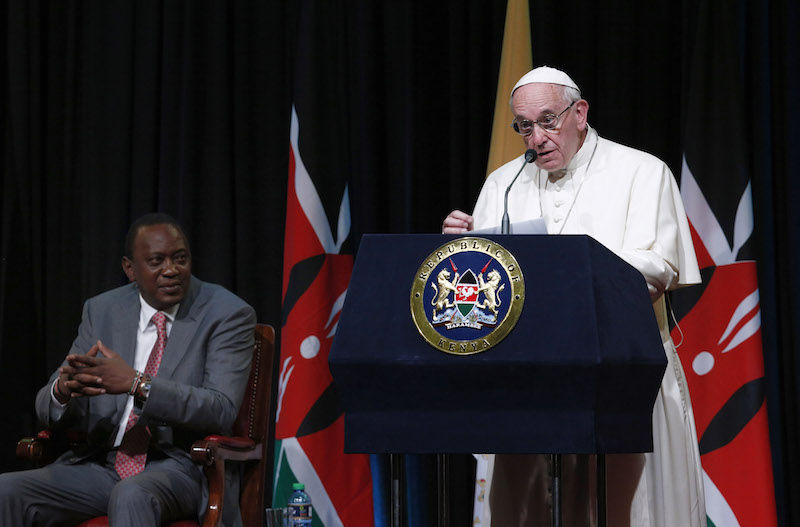Pope Francis began his trip to Africa in Kenya, where he praised the “young and vibrant nation” and encouraged Kenyans to continue working for peace in their country. “Experience shows that violence, conflict and terrorism feed on fear, mistrust, and the despair born of poverty and frustration,” Pope Francis said Nov. 25 during his first public address in Kenya. His arrival in the capital of Nairobi marks the first part of his Nov. 25-30 visit to Kenya, Uganda and the Central African Republic. The Pope greeted President Uhuru Kenyatta, government leaders and members of the diplomatic corps who received him at Nairobi’s State House. Pope Francis said that Kenya’s public officials have a special responsibility to work to protect peace and to secure a just society. “To the extent that our societies experience divisions, whether ethnic, religious or economic, all men and women of good will are called to work for reconciliation and peace, forgiveness and healing.” Kenya has suffered major terrorist acts in recent years. Last April, 147 people were killed when Al-Shabab militants opened fire on students at Garissa University in northeastern Kenya. The killers singled out those who identified as Christians. In 2013, 67 people were killed when terrorists attacked shoppers at the Westgate Mall in Nairobi. Pope Francis noted the need for courage. “Ultimately, the struggle against these enemies of peace and prosperity must be carried out by men and women who fearlessly believe in, and bear honest witness to, the great spiritual and political values which inspired the birth of the nation,” he said. The Pope praised the “richly diverse” nation of Kenya, saying that it plays an important role in the region as other countries work to create “a multiethnic society which is truly harmonious, just and inclusive.” The natural beauty and resources of the country are laudable, but so is the “strong appreciation” and “culture of conservation” that Kenyan people have for it, he said. The “grave environmental crisis” that humanity faces today requires “an even greater sensitivity to the relationship between human beings and nature” and support for “responsible models of economic development.” Young people in particular represent any nation’s “most valuable resource.” The Pope said that protecting the young is “the best way we can ensure a future worthy of the wisdom and spiritual values dear to their elders, values which are the very heart and soul of a people.” “We have a responsibility to pass on the beauty of nature in its integrity to future generations, and an obligation to exercise a just stewardship of the gifts we have received.” Pope Francis assured those present of the Church’s continued support for the country through education and charitable works. The Pope gave President Kenyatta a drawing of the facade of St. Peter’s Basilica by the architect Gian Lorenzo Bernini. The drawing dates back to the 17th century. President Kenyatta, in his remarks welcoming the Pope, noted the great opportunities and challenges facing Kenya, including efforts to promote highest standards in government, inclusivity and peace while also addressing environmental problems. The president noted the Catholic Church’s role as a “strong partner” in social and economic development in Kenya. The Church is the largest non-state provider of health care and runs numerous organizations for orphans and vulnerable children. The Church’s network of Catholic schools includes 8,000 primary and secondary schools, five colleges and a university. Kenya’s president noted that he too is a beneficiary of Catholic schools. President Kenyatta’s remarks closed with a prayer request: “Holy Father, I ask you to pray for Kenya, that God will hear us, that he will heal this land.”

